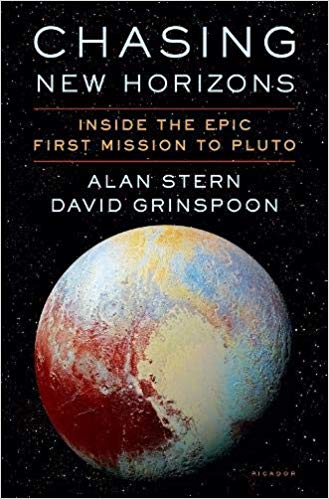
Longest post title ever? Possibly. Gotta love nonfiction books.
This is known: there exists an alternate-universe version of me who has a Ph.D and works as either an astronomer or a planetary geologist. I’ve been fascinated by this stuff for as long as I can remember, and every now and again I really wonder how it is that I didn’t take all that much math and science in college.
(Actually, I know why that’s true. My current enjoyment of mathematics dates to realizing how fascinating statistics was when I had to take a stats class for my … oh, wait, I was a Psychology major, among other things, so I guess I did have to take a fair number of science classes in college.)
(Let’s say “hard science” classes and piss off the psychology people. Like, science with math, which– other than stats– Psychology really doesn’t trouble itself all that much with. Shut up you know what I mean.)
Anyway. I followed the New Horizons mission with no small degree of fascination, and the data they’ve acquired about Pluto and its associated moons is endlessly interesting. Earlier this year the spacecraft did a flyby on a Kuiper Belt object now known as Arrokoth, and I believe there’s at least one more KBO flyby planned before the craft is shut down. Stern and Grinspoon’s book isn’t so much about the science, or about Pluto, however; it’s about the 20-plus-year effort to get the mission to explore the ninth planet(*) approved and the political and scientific process by which the mission itself actually came to be. As it turns out, there were a lot of people who for one reason or another didn’t want New Horizons to happen, and the mission was either actually cancelled or nearly cancelled five or six times, to say nothing of the number of times where something went wrong with the craft itself. For example, I wasn’t aware that they lost contact with the craft just a few days before the Pluto flyby began, and the book’s description of the mad scramble to not only reestablish contact with the by-then-several-billion-miles-away craft but to then slowly re-upload a bunch of mission-critical code updates before the thing sped by Pluto at thousands of miles per hour is compelling as hell.
So, yes– this book is less a work of popular science or a textbook about Pluto than it is a book about history and politics. It’s about the mission, not the planet, and while I wasn’t quite aware of that when I picked it up it’s no less of a good read for it– I’m always down to read something about NASA’s inner workings, and some of the squabbling that takes place between Caltech’s JPL (Jet Propulsion Laboratory) and the Applied Physics Laboratory (APL) at Johns Hopkins over who was going to actually design and build the spacecraft that eventually became New Horizons is pretty damn cool. One way or another, while I haven’t read a ton of nonfiction this year I’m glad I finally let this stop languishing on my shelf and picked it up. You’ll probably see it mentioned again in a month or so, when I write my 10– or possibly 15– best books of the year post for 2019. In the meantime, check it out.
(*) For most of the book, Pluto is very much considered a planet, and the authors’ open derision toward the new definition of “planet” that reclassified Pluto is hilarious. Needless to say, for these guys Pluto is the ninth planet and it ain’t going anywhere.

In an alternate universe, I went into science for a career and enjoyed it and wasn’t harassed into quitting (which eventually happened to a female friend of mine). But dyscalculia stopped me from doing science.
LikeLike
I wanted to be an astronomer when I was a kid, but hit a wall with algebra and physics in high school, so hard I never took advanced math or science again. Too bad, as I’ve since learned that many people get over that wall in college as their brains continue to develop.
I’m baffled by people who maintain their death grip on Pluto = Planet. Do you never change your mind about things as you acquire new info? I saw a kids’ book about Pluto this weekend with a subtitle including the words “ice dwarf:” so much more badass than “planet” I’d use it even if Pluto had more in common with the 8 than with the rest of its KBO neighborhood. 🙂
LikeLike